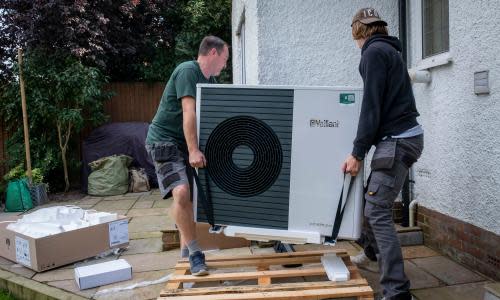The UK’s net zero strategy still avoids what is needed to avert climate catastrophe

The collection of new climate policies released by the government this week are being scrutinised for their ambition and effectiveness. But it is also crucial to judge them for their fairness. We need to reduce total emissions as rapidly as possible – “fairness” at a macro level means protecting poorer countries that have done little to cause the problem, and those countries that have emitted the most overall, such as the UK, moving fastest.
At a more micro level, fairness is also vital. The move to net zero will lead to major changes across all aspects of UK society, and a lot of less well-off people are understandably worrying whether they can afford to cut their emissions. It’s essential to design policies so that this transition is fair for individuals and that no one is left behind. This is not only the right thing to do, but it also makes sense politically: if fairness is not baked in then people will resist change, and that reasonable resentment will be magnified and manipulated by those seeking to delay action for other reasons.
So how do the government’s new policies stack up? While there have been bits and pieces of progress on things such as electric vehicles, we’re still lacking an ambitious and comprehensive plan to meet our targets and show real leadership on the world stage ahead of Cop26 in Glasgow.
When it comes to delivering the climate transition fairly, the government is starting to say the right things but is failing to put enough money where its mouth is. This plays into the hands of climate delayers, who are focusing increasingly on concerns around fairness to pressure the government to do less overall on climate. Winning that argument means being much more proactive in designing policy and investment to ensure that ambitious climate action and fairness go hand in hand.
The chancellor’s net zero review shows he is starting to understand that doing more on climate now is economically optimal. He has also paid lip service to fairness – although it would have been useful for him to be clearer that delaying, or doing less, are not solutions to the challenges he highlights.
But when we look at the policies and investments currently put forward, it’s clear the government is failing to grasp what fairness really means in practice. It’s conspicuous that many of the biggest gaps in the announcements this week have been in areas that have the greatest potential to boost the government’s “levelling up” agenda: for example, the absence of adequate support for low-income households to benefit from heat pumps as a substitute for new gas boilers. While there are some exciting cost-reduction projections for heat pumps at the moment, grants of £5,000 will likely still require consumers to stump up significant extra sums while we’re waiting for costs to drop. That leaves lower-income households out in the cold while better-off households can start to benefit from the new tech. A total of £4.76bn is needed in next week’s spending review to speed up the transition to heat pumps, including grants to cover the full costs for low-income households. This is something that’s backed by a wide range of business and environmental groups.
Another case is the strong emphasis on electric vehicles to decarbonise our transport system, without stumping up extra cash for public transport. Electrifying road transport is vital and costs are coming down rapidly, but climate experts are clear that we also need to dramatically reduce our private vehicle use and rely more on public transport, walking and cycling to get around. Almost a quarter of UK households do not own a car, rising to 65% for those on the lowest incomes, and poor public transport provision is one of the key reasons communities find themselves “left behind”.
Further, the government has dodged critical decisions about supporting fossil fuel workers to transition to green jobs and ending new oil and gas projects. Not only is this critical for the climate, it’s also vital for workers, who face increasing volatility and job insecurity. In a Greenpeace, Platform and Friends of the Earth Scotland survey of more than 1,000 offshore workers, 81% said they would consider leaving the industry, with more than half saying they would be interested in working in renewables with the right support to retrain. Yet while all agree we don’t want to repeat the calamity of communities left stranded by changing industries, as happened when large-scale coal mining ended in the UK, attempts to facilitate this transition remain thin on the ground.
The lack of genuine action on fairness in the government’s net zero plan is enough to make one wonder whether Sunak is serious about tackling the problem, or whether he’s signalling his own ambivalence to the decarbonisation agenda. The spending review next week will be the real test for the chancellor. We don’t have time for political games. Any hardline ideological commitments to a small state and fiscal conservatism need to bow to the now-scary science, and allow the government to intervene to prevent “the biggest market failure the world has ever seen”.
Rebecca Newsom is head of politics at Greenpeace UK

 Yahoo Finance
Yahoo Finance 